Nicola Porpora was more famous at the time for his achievements in fostering many vocalists than as a composer. He was invited to London in 1729 by the “Opera of the Nobility”. It was to compete with Handel at the Royal Opera House, Covent Garden. However, he was not successful, and in 1733 he invited his pupil Farinelli to join him. Farinelli was enthusiastically received by London audiences. But in the end, he was not able to overturn the deficit for the “Opera of the Nobility”. This is depicted in the film “Farinelli Il Castrato”. In 1748, after serving as the Elector of Saxony’s court music director in Dresden, he went to Vienna and train Haydn there. During his stay in Vienna, he published a collection of violin sonatas in the style of Corelli, which was fifty years earlier. His later years were said to be unfavorable.
https://bit.ly/4dToq8u
As for the other hand Farinelli, Charles Burney, in his “The Present State of Music in France and Italy” devotes a considerable number of pages to mentioning him, and includes a fairly detailed account about his life, and as well as recent situations and interviews as of 1770. At that time, Farinelli had retired from the opera world and was living a comfortable life in Bologna.
Philippe Jaroussky is a lone master of technique and expression. With a perfectly controlled voice, he sang the Farinelli repertoire by Porpora on this CD. The coloratura technical aria “Come nave in ria tempest (Semiramide, Queen of Assyria)” is excellent, but that deserves special mention here is the slow, lyrical arias. “Alto Giove (Polifemo)” is a masterful rendering of the emotionality of the piece. The cadenza at the end of the eighth aria, “Nell’attendere il mio bene (Polifemo)” is reminiscent of the battle with the trumpet in the movie “Farinelli Il Castrato”. “Placidetti zefiretti (Polifemo)” and “La gioia ch’io sento (Mitridate)” are sung as duets with Cecilia Bartoli. Nine of the eleven songs are world premiere recordings. #baroque #jaroussky #片山俊幸


